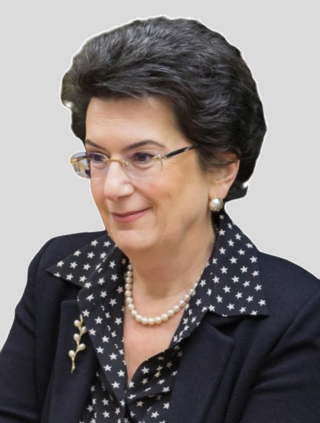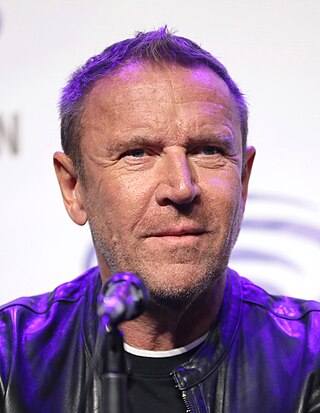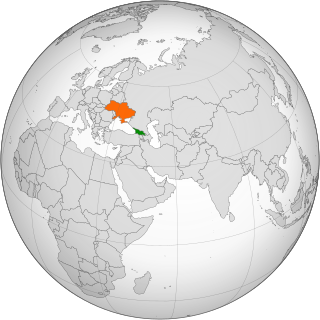
Mikheil Saakashvili is a Georgian and Ukrainian politician and jurist. He was the third president of Georgia for two consecutive terms from 25 January 2004 to 17 November 2013. From May 2015 until November 2016, Saakashvili was the governor of Ukraine's Odesa Oblast. He is the founder and former chairman of the United National Movement party. Saakashvili heads the executive committee of Ukraine's National Reform Council since 7 May 2020. In 2021 he began serving a six-year prison sentence in Georgia on charges of abuse of power and organization of an assault occasioning grievous bodily harm against an opposition lawmaker, Valery Gelashvili.

Nino Burjanadze is a Georgian politician and lawyer who served as Chairperson of the Parliament of Georgia from November 2001 to June 2008. As the first woman, she has served as the acting head of state of Georgia twice; the first time from 23 November 2003 to 25 January 2004 in the wake of Eduard Shevardnadze's resignation during the Rose Revolution, and again from 25 November 2007 to 20 January 2008, when Mikheil Saakashvili stepped down to rerun in the early presidential elections. She withdrew into opposition to Saakashvili as the leader of the Democratic Movement-United Georgia party in 2008. In October 2013, she ran in the presidential election, competing against 22 candidates. She ended third with 10 percent of the vote.

Renny Harlin is a Finnish film director, producer, and screenwriter who has worked in Hollywood, Europe, and China. His best-known films include A Nightmare on Elm Street 4: The Dream Master, The Adventures of Ford Fairlane, Die Hard 2, Cliffhanger, The Long Kiss Goodnight, and Deep Blue Sea.

The Georgian–Ossetian conflict is an ethno-political conflict over Georgia's former autonomous region of South Ossetia, which evolved in 1989 and developed into a war. Despite a declared ceasefire and numerous peace efforts, the conflict remained unresolved. In August 2008, military tensions and clashes between Georgia and South Ossetian separatists erupted into the Russo-Georgian War. Since then, South Ossetia has been under a de-facto Russian control.

Emmanuelle Sophie Anne Chriqui is a Moroccan Canadian actress. She is known for playing Sloan McQuewick on HBO's Entourage (2004–2011), Claire Bonner in Snow Day (2000), Dalia in You Don't Mess with the Zohan (2008), Lorelei Martins on CBS's The Mentalist (2008–2015), and Lana Lang on The CW's Superman & Lois (2021–2024).

Irakli Alasania is a Georgian politician, soldier and former diplomat who served as the Minister of Defense of Georgia from 2012 to 2014. He was Georgia's Ambassador to the United Nations from September 11, 2006, until December 4, 2008. His previous assignments include Chairman of the Government of Abkhazia(-in-exile) and the President of Georgia's aide in the Georgian-Abkhaz talks. Soon after his resignation, Alasania withdrew into opposition to the Mikheil Saakashvili administration, setting up the Our Georgia – Free Democrats party in July 2009. In 2012 Alasania was appointed Minister of Defense, a position he held until 2014.

Imedi Media Holding is a private television and radio company in Georgia. The stations were founded by the Georgian media tycoon Badri Patarkatsishvili. The station mainly concentrates on news and analytical coverage, but broadcasts pop music as well, particularly at nighttime. Imedi means "hope" in Georgian.

Since their independence from the Soviet Union, Georgia and Ukraine have forged close political and cultural relations. The diplomatic relations between the two nations are realized at the level of embassies and consulates. Due to the prosecution in Georgia of Georgian/Ukrainian politician Mikheil Saakashvili and the 2022 Russian invasion of Ukraine, relations between the two countries have soured significantly.

In 2007, a series of anti-government protests took place across Georgia. The demonstrations peaked on 2 November 2007, when 40,000–50,000 people rallied in downtown Tbilisi, the capital of Georgia. People protested against the allegedly corrupt government of president Mikheil Saakashvili. Protests triggered by detention of Georgian politician Irakli Okruashvili on charges of extortion, money laundering, and abuse of office during his tenure as defense minister of the country were organized by the National Council, an ad hoc coalition of ten opposition parties, and financed by the media tycoon Badri Patarkatsishvili. Demonstrations occurred both in September and November 2007 and were initially largely peaceful. The protests went downhill by 6 November 2007, but turned violent the next day when the police, using heavy-handed tactics, including tear gas and water cannon, unblocked Rustaveli Avenue, Tbilisi's main boulevard, dislodged the protesters from the territory adjoining to the House of Parliament, and prevented the demonstrators from resuming the protests. The government accused the Russian secret services of being involved in an attempted coup d'état and declared a nationwide state of emergency later that day which lasted until 16 November 2007.
2007 in Georgia saw a number of military incidents involving Georgia and Russia over the Abkhazia area. Abkhazia is a partially recognised state within Georgia's territory. In March, Georgia accused Russia of attacking the Kodori Valley in Upper Abkhazia, which was the only area in Abkhazia that Georgia controlled. Russia denied the claims, saying that their aircraft in the area were grounded at the time. In August, Georgia claimed that Russia fired a missile into Georgia. This claim was confirmed by 2 investigation teams but challenged by a Russian investigation team. Also in August, Georgia claimed it shot down Russian aircraft that were in Georgia's airspace over the Georgia-controlled Upper Abkhazia area. Russia denied this claim and Abkhazia said that it was an American or Georgian aircraft that crashed in Abkhazia. Abkhazia also held elections that were not recognised by any countries. The president was Mikheil Saakashvili, who stepped down in November to run in the 2008 elections, which he won, again becoming president and replacing Nino Burjanadze who had been acting president since he stepped down.

Though tensions had existed between Georgia and Russia for years and more intensively since the Rose Revolution, the diplomatic crisis increased significantly in the spring of 2008, namely after Western powers recognized the independence of Kosovo in February and following Georgian attempts to gain a NATO Membership Action Plan at the 2008 Bucharest Summit; and while the eventual war saw a full-scale invasion of Georgia by Russia, the clashes that led up to it were concentrated in the breakaway republics of Abkhazia and South Ossetia, two separatist Georgian regions that received considerable Russian support over the years.

In 2009, a mass rally by a coalition of opposition parties took place in Georgia against the government of President Mikheil Saakashvili. Thousands of people demonstrated, mainly in the capital, Tbilisi, starting on 9 April 2009, demanding Saakashvili's resignation. On the first day of demonstrations, up to 40,000 people gathered in Tbilisi. Protests continued for over three months, although fewer people participated as time passed than during the first days. On 26 May 2009, the Georgian Independence Day, 60,000 protesters took part. Although peaceful at first, there were incidents of fighting between the Georgian police and protesters. The daily rallies gradually dwindled and ended, without achieving any tangible results, on 24 July –107 days after they kicked off.
The 2009 Georgian mutiny was a mutiny by a Georgian Army tank battalion based in Mukhrovani, 30 kilometres (19 mi) east of the capital Tbilisi on 5 May 2009. It is not yet known how many soldiers took part. Later that day, the Georgian Ministry of Interior announced that the mutineers had surrendered. Some of its leaders, including the battalion's commander, were arrested; others managed to escape. The mutiny broke out after the government announced that it had uncovered what it claimed was a Russian-backed plot to destabilize Georgia and assassinate President Mikheil Saakashvili. Later, Georgian authorities retracted their accusations of an assassination plot and allegations of Russian support.
Mirza Davitaia is a Georgian politician who served as the State Minister of Georgia on Diaspora Issues from 2009 to 2012.

Parliamentary elections were held in Georgia on 1 October 2012. The opposition Georgian Dream coalition of billionaire businessman Bidzina Ivanishvili won a majority of the seats. President Mikheil Saakashvili conceded his party's defeat.
Events in the year 2012 in Georgia.
In 2013, Georgia finalized its first-ever peaceful change of power and transition to a parliamentary republic. The Georgian Dream-dominated government, which came to power after defeating, in October 2012, the United National Movement led by the outgoing President Mikheil Saakashvili, promised more democratic reforms. The Georgian Dream candidate Giorgi Margvelashvili won the presidential election in October 2013 and the new constitution significantly reducing the authority of the president in favor of those of the prime minister and government came into effect. In November, the leader of the Georgian Dream, Prime Minister Bidzina Ivanishvili announced his withdrawal from politics as promised earlier, and the Parliament of Georgia approved his nominee, Irakli Garibashvili, as the country's new head of government.
The events in 2010 in Georgia.












